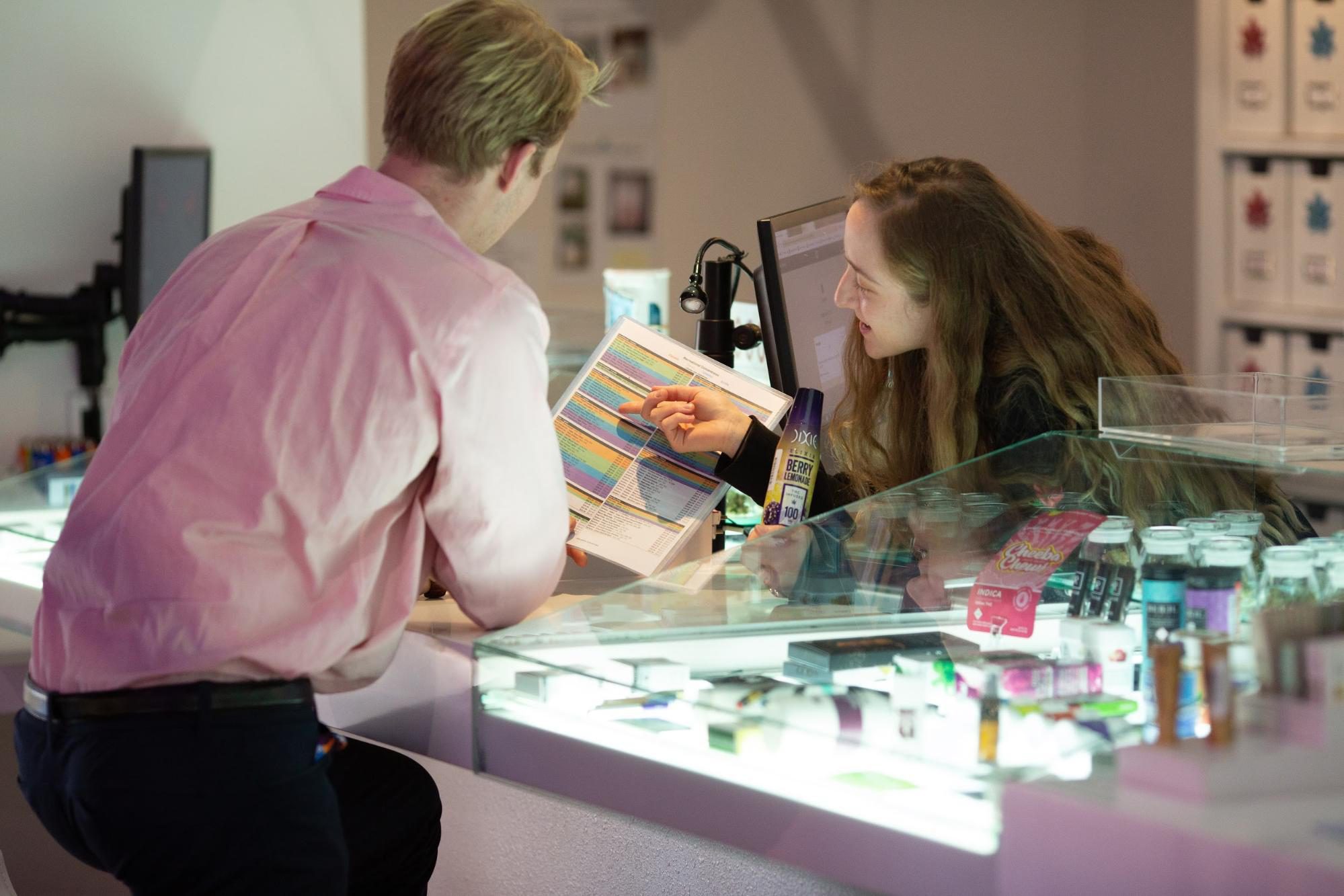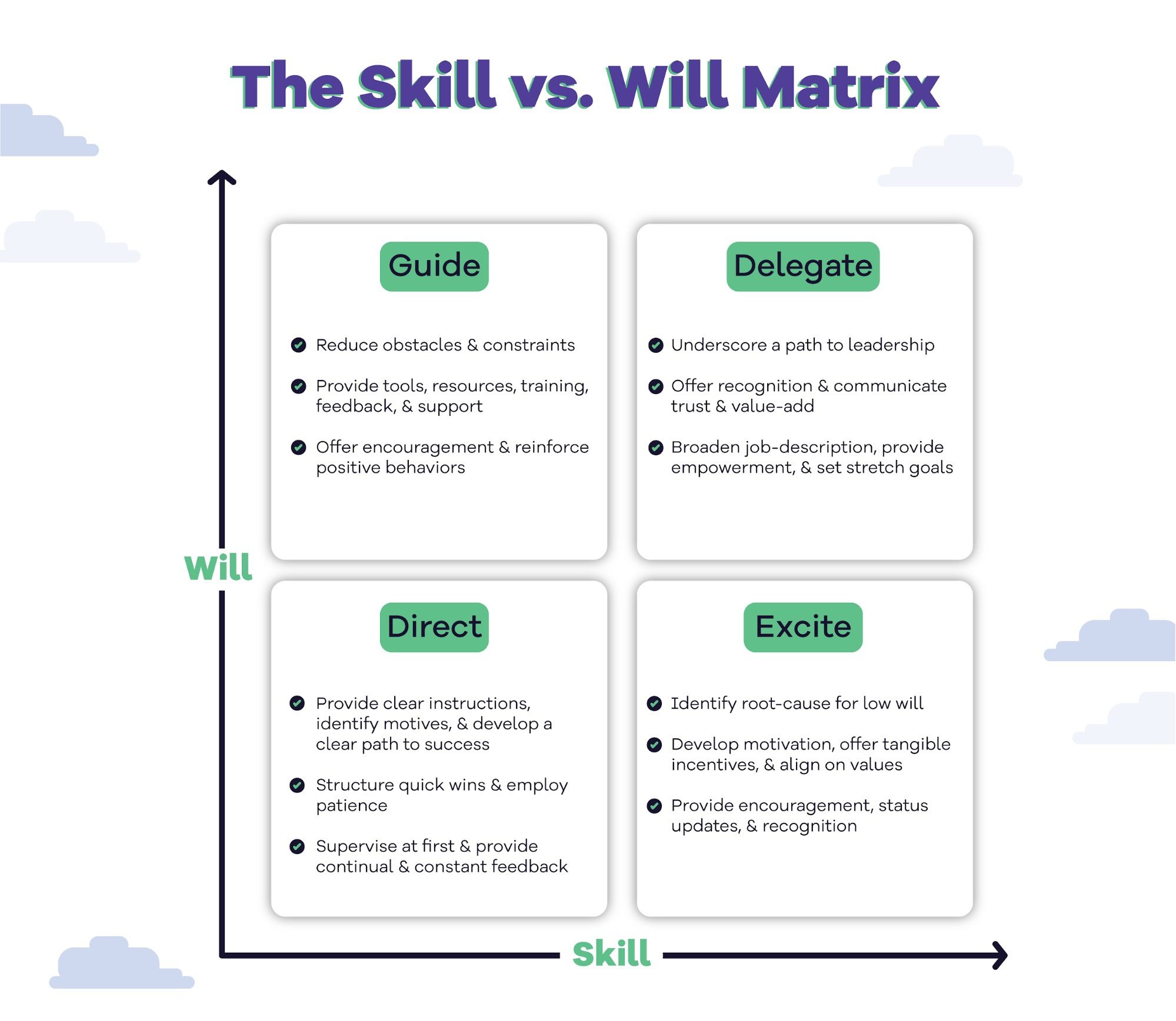Cannabis competition is heating up with wholesale prices plummeting, new dispensaries opening daily, and massive multi-state operators snatching market share from underperforming rivals.
Dispensaries need to sell more to survive. Attracting new customers often requires expensive marketing, especially if you're opening a new dispensary. Luckily, is a more effective option: improving the performance of front-of-house employees to increase sales while reducing costs.
At SparkPlug, our research and work with hundreds of dispensaries across state markets shows that two principles drive better customer experience and higher per-employee revenue: skill and will
If you’re short on time, here are a few key takeaways for immediately boosting dispensary sales:
- Top-performing sales teams balance skill and will. Knowledgeable budtenders paired with strong motivation deliver consistent results.
- Training is foundational. Without a baseline of product knowledge and sales expertise, motivation cannot translate into revenue.
- Engagement multiplies impact. Feedback, performance transparency, and incentives build lasting motivation.
- Measurement is essential. Training and incentive programs need to be tracked against outcomes to prove ROI.
- Scale what works. Double down on the programs, employees, and tactics that consistently improve performance.
For the last seven years, I’ve been working with cannabis retailers across the U.S. to help them manage and motivate their frontline employees. From large multi-state operators to the small mom-and-pop shops, I have been fortunate to work with many wonderful leaders helping to shape the future of the legal cannabis industry.
While some of these leaders come from traditional retail, bringing a depth of experience in team management, merchandising and customer service, many others have spent entire careers working in cannabis, dedicating their professional lives to helping the industry transition away from decades of prohibition.
So although the experiences and skillsets of these managers and executives differ widely, in our experience successful dispensaries are universally led by operators that take a customer-centric approach to their businesses. They obsess over each and every touchpoint they have with their customers, whether it’s digitally via email or text loyalty, out in the real world via advertisements or event sponsorships, or in-store via the physical and experiential design of the dispensary itself.

Now to take things a step further, the most successful retailers we work with recognize that being customer-obsessed necessarily means being obsessed with developing an elite team of employees who are bought into your organizational culture. Whether you call them budtenders, patient advocates, or retail sales associates, it is undeniable that the employees working in dispensaries yield powerful influence over purchasing behavior. Most importantly, it's crucial to create a proper dispensary organizational structure to build staff transparency.
More than 70 percent of online dispensary reviews cite an interaction with an employee as a determining factor in the quality of the customer’s experience. And in studies conducted by my team, we have found that 92 percent of the time consumers purchase the exact product recommended by the in-store employee.
If you’re failing to leverage the influence of these employees effectively, you’re leaving money on the table, plain and simple. Despite headwinds like sky-high employee turnover rates and a dearth of well-trained sales-people in the space, you can get the most out of your team with a strategic combination of skill and will.

Skill refers to your employee’s level of expertise regarding the products you carry combined with their knowledge of sales techniques and retail best practices, while will refers to the intrinsic desire to show up each day ready to serve customers, crush sales and give you their "all". Even the most motivated employee needs a baseline set of skills before they can effectively sell cannabis products, and even the most skilled employee needs a baseline level of motivation to achieve sales success.
A quick thought experiment to land the concept: if I offered you a million dollars to paint a perfect copy of the Mona Lisa, you might well be extremely motivated to complete the task, but (unless you’re an accomplished artist) I’d bet you still wouldn’t have the artistic chops to get it done. On the flip side, if I called up a world-famous artist and asked her to complete the same task for no reward, she might well have the skills to make it happen, but she’d have no motivation to do so. The balance of skill and will permeates the success of every dispensary employee in the same way, so let’s break down how to achieve both.
Skill
We can divide the ideal budtender skillset into two categories: product knowledge and sales acumen.
The legal cannabis industry is new and vast, and due to the wide range of product types, relatively uneducated customer base, and decades of misinformation, consumers have a seemingly endless list of questions and concerns. Ensuring employees have a firm grasp on matters such as potency, strain, terpene profile, and the myriad brands and methods of administration is the best way to inspire trust among customers and keep them coming back.
Most cannabis retailers recognize the importance of having a knowledgeable and informed team of frontline staff. But while many operators we work with have training programs in place, few of them are as comprehensive as they should be. One way to address this is through structured education programs that cover cannabis fundamentals, product knowledge, and sales best practices. SparkPlug, for example, has a feature called Courses that allows retailers and brands to upload and assign training content, track completion, and connect education to sales results. This makes it easier to see which learning initiatives are having the greatest impact on the floor.
Read next
Budtender Certification and Training: The Opportunity for Cannabis Dispensaries
While the cannabis industry certainly poses unique hurdles, the challenge of cultivating a knowledgeable and educated sales-floor team is par for the course in retail. Unlike traditional retailers like Old Navy or Target, however, cannabis dispensaries have a key advantage: a unique and self-selecting talent pool that opts to work in the cannabis industry. Almost universally, you can expect these employees to have a passion for cannabis and a deep desire to see its de-stigmatization and broader adoption.
As such, if you treat your employees as professionals, provide ample opportunities to learn about products, cannabis science and selling strategies while emphasizing a culture of constant growth, the rest will take care of itself. Your customers will undoubtedly take notice, return to the store more consistently, and spend more when they do.
Will
Many leaders ignore their role in generating will amongst employees, but great leaders understand the complex psychology of inspiring individuals to perform at their best every day. They lay the seeds for a workplace where frontline employees are encouraged to see the bigger picture of how their daily contributions impact not just their business, but the industry and their communities.
If that doesn’t sound like your team just yet, don’t feel too bad. Unfortunately, one of the near-universal truths I’ve uncovered is that working on the frontlines of the cannabis industry, like many retail jobs, can be brutal. Long hours, thankless work, difficult customers and arduous regulatory standards all contribute to the ~35 percent quarterly turnover rate among cannabis retail employees. Even traditional retailers struggle with this challenge.
While some operators are happy to churn-and-burn through their workforce, we find the most successful cannabis retailers are finding ways to invest in and empower their employees to be the best possible representatives of not only their dispensary and the brands they carry, but the emerging industry at-large. Moreover, by investing in and retaining their top employees, retailers can avoid the massive hiring costs, productivity losses, and compliance risks of constantly on-boarding new workers.
Inspiring the will to succeed is a complex process, but it boils down to three major levers. Clarity of mission, team orientation and positive feedback loops.
Clarity of mission
When employees feel undervalued and burnt out, sooner or later they are going to resign themselves to doing the bare minimum just to collect a paycheck — that is, until another opportunity comes along and they gladly jump ship for a 20 cent per-hour raise. As such, having a clear statement of your company’s mission is a must for inspiring your employees to work for something more meaningful than the day-to-day drudgery of a retail job.
For example, consistently stating (e.g. at the start and end of each team meeting) that the mission of your store is to “help our customers lead happier, healthier lives through cannabis” and proudly displaying or disseminating reviews from customers who have benefitted from their experience at your store will go a long way towards inspiring your employees.
Team orientation
Many employers in the cannabis industry fail to acknowledge the importance of a team orientation. They resist the responsibility of engaging employees and wildly underestimate the importance of cultivating an environment where employees love showing up to work each day. Often, they will blame “lazy workers,” or sometimes more broadly, “millennials.” But the truth is, culture is determined from the top down. The onus is on company leadership to find ways to bring meaning to their employees’ work.

A huge part of employees’ connections to your business is social — often they care more about the team they work with and managers they work for than the business itself. If employed correctly, this can be a powerful strength. Try hosting team events to encourage friendships among co-workers, framing successes and failures in terms of how they help or hurt the team, and emphasizing the responsibility of high performing team members to support those that are new or struggling.
Positive feedback loops
Finally, it’s critical to create positive feedback loops for the behaviors you’re looking to encourage. These can be as simple as providing a public, daily piece of positive encouragement to a specific team or employee for a skill learned, a particular milestone reached, or a job uniquely well done. With a bit more investment of time and capital, you can create a sales and execution based incentive program that directly rewards employees for their success. Depending on the regulations in your given market, providing commissions on total sales, free products for hitting sales goals or bonuses for outperforming benchmarks are all effective ways to directly tie the employee’s performance to their reward, which is one of the most powerful motivators in your toolbox.
What’s more, you can consider supercharging these incentives via competition — offering prizes to a store’s top budtenders, the shift with the greatest average ticket size or the store with the highest units per transaction takes advantage of both the incentive-based motivations and cultural, team-based motivators we’ve touched on. Investing in technology that helps you accurately track sales results in real-time, manages contests and incentives, and can assist with training will go a long way in producing the desired results here, but other rules of thumb include:
- Focusing on a near-term goal that’s transparent, objective, and explicitly clear to the whole team
- Soliciting employee suggestions when establishing team goals
- Creating incentives that align directly with the organization’s financial performance
Putting it all together
Let’s summarize the practical steps we can take to deploy a skill and will sales strategy:
- Determine your goal. Are you looking to increase total sales by $10,000? Improve order averages by 15 percent? Make sure to have a clear statement of the one thing you’d like to accomplish with the sales enhancement campaign.
- Determine what you’ll measure to know whether you’ve hit the goal. This should be easy to do if you have a clear goal, just make sure this is a strictly measurable number that you can compare to the goal you set out to hit.
- Determine your plan. How will you achieve this change? Perhaps via a sales contest with a prize for the top performers to enhance their will? Or maybe with an upselling education campaign to enhance their skill? What’s critical in this step is to ensure that you’re isolating things to one intervention at a time, that way you can tell exactly what produced the results you’re seeing.
- Determine the systems you’ll use to implement the plan. Will this be done by hand, or perhaps utilizing your POS reports from Flowhub or a sales gamification tool like SparkPlug. Make sure whatever you choose will effectively measure the results of your campaign based on the goals and measurements we established above.
- Compare your results to the goal you set. Did we increase sales by $10,000 this month? Did order averages increase by 15 percent?
- Adapt the plan and repeat it. If you hit your goal, adjust the goal up and try again to see how far you can go. If you didn’t hit the goal, try a different tactic and measure the results. The more campaigns you perform in this structure, the more you’ll learn about what works in your dispensary and what doesn’t.
Ready to turn skill and will into measurable results? Build high-performing dispensary teams with SparkPlug integrated with Flowhub. Learn more.




